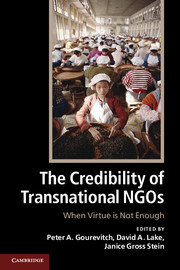8 - Credibility and compromises
from Conclusion
Published online by Cambridge University Press: 05 June 2012
Summary
Credible non-governmental organizations (NGOs) may not succeed in bringing about social change. The task may simply be too large, as humanitarian organizations with limited resources and many poor to feed can attest. Others may not share the activists’ political agenda, as is perhaps the case in many areas where the demand for ethically grown food or manufactured goods remains small. Credibility is no guarantee of success. NGOs that lack credibility with key audiences, however, are almost certain to fail in their quest to bring about social change. If their claims are not perceived as trustworthy, their statements and efforts will be disregarded. Election monitors from authoritarian countries who certify every election no matter how obviously corrupt have little sway with those who seek to promote democracy (Chapter 2, this volume). Monitors of ethical goods who are sponsored or controlled by manufacturers, such as Kaleen in the case of hand-woven rugs (see Chapter 3, this volume), have difficulty gaining support among consumers. Humanitarian organizations that are too opportunistic – or who become “moral suspects” (Chapter 6, this volume) – will lose the support and confidence of their donors and the targets whose behavior they wish to change. Credibility matters. It may not be sufficient for NGOs seeking to bring about social change, but it is necessary.
Knowing this, NGOs work hard to protect and build their reputations as trustworthy actors. Many NGOs are indeed virtuous. As organizations and individuals they are sincerely committed to their causes. Their virtue, in turn, is the rock upon which their credibility rests. But in a world in which NGOs must be mindful of their organizational interests, and in which skeptical audiences understand this fact, virtue may not be enough. NGOs promote bonds with others around common values – in essence, advertising their virtue and tapping into the desires of others to be virtuous. They adopt autonomous governance structures to minimize conflicts of interest and create a measure of organizational and, especially, fiscal transparency. These strategies were embraced by nearly all the NGOs examined in this book. They also become more professional and integrate themselves into communities of similar professional organizations – demonstrated clearly in the cases of local humanitarian NGOs in Bolivia (Chapter 5, this volume) and Islamic Relief (Chapter 6, this volume), especially once the latter’s virtue came under challenge. And when their own efforts at change are hard to observe, as with the case of Rugmark (Chapter 3, this volume), they expend costly effort in more tangible ways, such as building schools, to demonstrate their commitment to their respective causes. NGOs are not passive repositories of credibility created by exogenous circumstances but, rather, seek to shape actively how they are perceived by their audiences.
- Type
- Chapter
- Information
- The Credibility of Transnational NGOsWhen Virtue is Not Enough, pp. 193 - 207Publisher: Cambridge University PressPrint publication year: 2012
- 3
- Cited by

